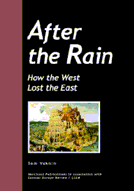"After Tito, Tito"—this was the battle cry of the Communist leadership in the republics of former Yugoslavia following the death of the great helmsman. To learn from history, one must transcend (though not ignore) details.
There are undercurrents and overriding themes in Serb history that recur and appear immutable. There is no reason to believe that the election of the hitherto non-corrupt and fiercely nationalistic law professor Vojislav Koštunica will miraculously transform the apparently ineluctable essence of Serb history and its salient proclivities:
I. Personality cults
The peoples of the Balkans are prey to the "strong man" syndrome. In Yugoslavia, the hedonistic and narcissistic Tito is one example. The turncoat Communist Milošević in Serbia is another. Idealization is followed by devaluation and dispossession. In quasi-tribal societies rocked by historical tidal waves and subject to traumatic ruptures, the superstitious belief in leaders is common.
II. Networks
Balkan societies are organized in (often regional) networks of political patronage: business and crime in equal measures. Politicians, criminals and businessmen are indistinguishable and interchangeable. The disintegration of the former Yugoslavia�a Serb empire founded on the self-interested collusion of such networks�only exposed them to the scrutinizing glare of the media and competing emerging elites.
III. Exclusionary national narratives
The Serbs-and every other nation and "nation" in the Balkans-rely for their cohesion and functioning on a national narrative. These narratives are always exclusionary and xenophobic, part myth, part fact hastily assembled into a

|
IV. The paranoid streak
How often one hears these sentences in the Balkans in general and in Serbia, in particular: "The whole world is against us"; "No one can understand us"; "It is all so complicated that it cannot be comprehended nor explained." Theories of conspiracy share venue with superstitions and plangent grievances. A siege mentality prevails and the "Massada Complex" is an ingredient of decision making.
V. Violent conflict resolution
Perhaps as an inescapable consequence of all the above, the Balkans (and Serbia) lack institutions (though it fanatically maintains the verisimilitude of having ones). The ultimate arbiter has always been raw force or the threat of using it. The disempowered are passive-aggressive. Recondite sabotage and pertinacious stonewalling are their modes of self-defense and self-expression. The unregenerate power elites react with contemptuous suppression and raging punishment. It is a war from within to mirror the war from without. The result is a moral quagmire of depravity and perfidy.
One cannot distil the spirit of a nation into five points. One can predict with certainty only the past. But if learning history and from history has any meaning, the past should reliably foretell the future. And Serbia's past is clear. May it diverge from it this time. The Serbs deserve it.
Sam Vaknin,[*] 17 October 2000
Rebuttal
In 1850, Vaknin would have assured us that American slavery was here to stay. In 1900, that the patriarchal polities of Europe would never allow women to vote. In 1950, he would have joined the army of scholars and pundits who scrutinized Germany's history and national character to prove that it could never be a democracy. And would probably have added that there would never be lasting peace with its age-old enemy France.
The selective history and claims about its "immutable" themes and "ineluctable essence," the blanket psychological labels like "paranoid" and "passive-aggressive"—all of this resembles nothing so much as the flip side of the crudest nationalist narratives. Such frameworks have been used to "understand" many regions and peoples. For the long, colorful and inglorious history of their application to "the Balkans," I recommend Maria Todorova's Imagining the Balkans and Vesna Goldsworthy's Inventing Ruritania.[1]
In my piece, I discussed Koštunica's politics and the existence of more positive national narratives. Here I'd say that I agree that corruption and criminality will remain features of political and economic life. But they can be challenged and reduced over time, partly through the media attention and political competition that Vaknin mentions; through the institution-building whose possibility he denies; and also through generous, far-sighted and carefully targeted assistance from the West.
Dušan Djordjevich, 21 October 2000
The case against:
Read Dušan Djordjevich's article arguing against the thesis.
Sam Vaknin is General Manager of Capital Markets Institute Ltd, a consultancy firm with operations in Macedonia and Russia. He is an Economic Advisor to the Government of Macedonia.
DISCLAIMER: The views presented in Sam Vaknin's articles represent only the personal opinions and judgements of the author.
Moving on:

Sam Vaknin's book on sale from CER as a print book and as an ebook
Read an external review
|
- Archived articles on Yugoslavia
- Archive of Sam Vaknin's articles in CER
- Browse through the CER eBookstore for electronic books
- Buy English-language books on Central Europe through CER
- Sam Vaknin's Website
- Return to CER front page
- Buy Maria Todorova's Imagining the Balkans from Amazon.com
- Buy it from Amazon.co.uk
- Buy Vesna Goldsworthy's Inventing Ruritania from Amazon.com
- Buy it from Amazon.co.uk



